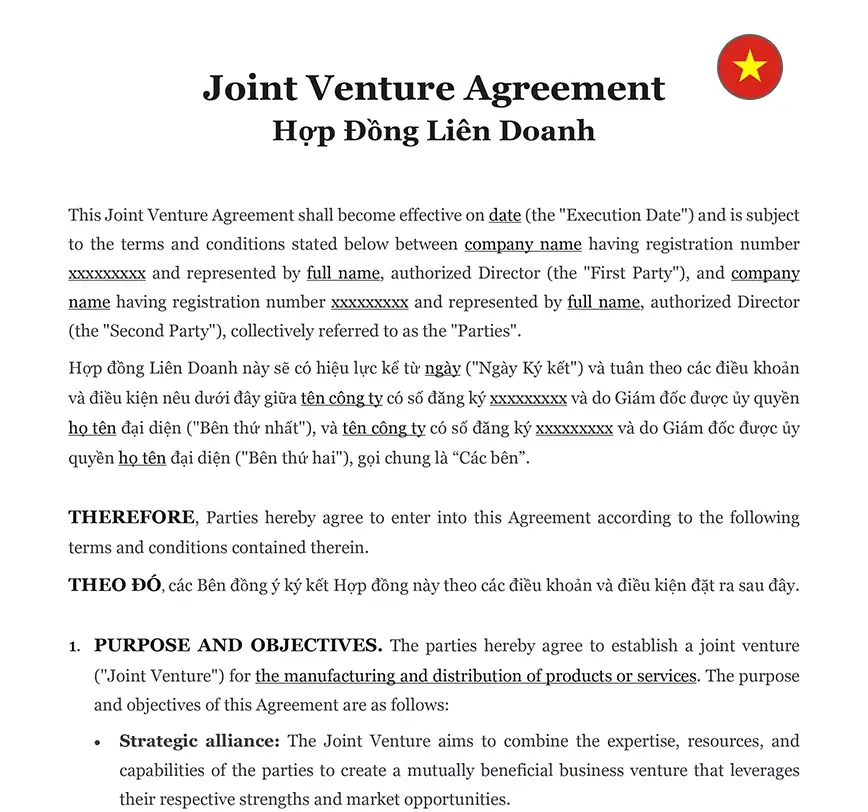Ready to use legal template
Drafted by experienced lawyers
Vietnamese-English translation
Ready to use legal template
Drafted by lawyers
Vietnamese-English translation
Home › Business contracts › Joint Venture Agreement
Learn more about Joint Venture Agreement in Vietnam
A Joint Venture Agreement is a pivotal document outlining the terms and conditions under which two or more parties agree to collaborate on a specific business project or enterprise, sharing risks, profits, and control. At Themis Partner, we understand the importance of clarity and compliance in legal agreements. That’s why our Joint Venture Agreement template is meticulously crafted by our expert team of lawyers to align with Vietnamese law while offering the convenience of an easily editable Word format. Streamline your business partnerships with confidence, knowing that your agreements are legally sound and professionally drafted.
Table of contents
-
What is a Joint Venture Agreement?
-
What is included in a Joint Venture Agreement?
-
Why do I need a Joint Venture Agreement in Vietnam?
-
What are the different types of Joint Venture Agreements?
-
What are the tax implications of a Joint Venture Agreement?
-
Are there specific regulations for joint ventures in Vietnam?
-
How do I modify or terminate a Joint Venture Agreement?
What is a Joint Venture Agreement?
A Joint Venture Agreement serves as the cornerstone for partnerships between two or more entities embarking on a shared business endeavor. This legally binding document delineates the terms and conditions governing the collaborative effort, ensuring clarity and alignment of expectations among all parties involved. It typically encompasses critical aspects such as the objectives and scope of the joint venture, each party’s contributions in terms of resources or expertise, the distribution of profits and losses, decision-making processes, and mechanisms for resolving disputes or terminating the agreement. Through comprehensive provisions and careful drafting, a Joint Venture Agreement aims to establish a solid foundation for cooperation while mitigating potential risks and uncertainties.
In essence, a Joint Venture Agreement functions as a roadmap guiding the operations and interactions of the collaborating entities throughout the duration of the venture. By delineating rights, obligations, and governance structures, it provides a framework for effective decision-making, risk management, and conflict resolution, thereby fostering a harmonious and mutually beneficial partnership. This foundational document not only clarifies the expectations and responsibilities of each party but also safeguards their interests by establishing clear guidelines for accountability and performance evaluation. Ultimately, a well-crafted Joint Venture Agreement lays the groundwork for successful collaboration, enabling the parties involved to leverage their respective strengths and resources towards achieving shared business objectives.
What is included in a Joint Venture Agreement?
A Joint Venture Agreement typically encompasses several key elements essential for defining and governing the collaboration between the participating entities. These elements include:
Introduction and Background:
This section provides an overview of the parties involved, the purpose of the joint venture, and the context in which the agreement is being formed.
Objectives and Scope:
Clear delineation of the goals and scope of the joint venture, including the specific project or business venture being undertaken.
Contributions:
Specification of the contributions each party will make to the joint venture, which may include financial investments, assets, resources, expertise, or intellectual property.
Management and Governance:
Establishment of the organizational structure, decision-making processes, and management responsibilities within the joint venture, including the appointment of key personnel or committees.
Profit Sharing and Distribution:
Formulation of the mechanism for distributing profits and losses among the parties, outlining the percentage or method of allocation.
Term and Termination:
Determination of the duration of the joint venture and conditions under which the agreement can be terminated, including provisions for early termination or extension.
Confidentiality and Intellectual Property:
Protection of confidential information and intellectual property rights belonging to the parties, with provisions for confidentiality agreements and ownership of joint venture-related intellectual property.
Dispute Resolution:
Establishment of procedures for resolving disputes or disagreements that may arise during the course of the joint venture, such as negotiation, mediation, or arbitration.
Liability and Indemnification:
Allocation of liability and responsibility for any losses, damages, or legal claims arising from the joint venture activities, along with provisions for indemnification.
Exit Strategies:
Provision for the withdrawal or exit of a party from the joint venture, including buyout mechanisms, transfer of interests, or winding up procedures.
Why do I need a Joint Venture Agreement in Vietnam?
A Joint Venture Agreement in Vietnam is important for several reasons:
1. Clarifies Roles and Responsibilities: Clearly defines the roles and responsibilities of each party involved in the joint venture.
2. Establishes Contribution Terms: Specifies the capital, resources, and services each party will contribute.
3. Outlines Profit and Loss Sharing: Details how profits and losses will be shared among the parties.
4. Defines Management Structure: Establishes the management and governance structure of the joint venture.
5. Regulates Decision-Making Processes: Sets out decision-making processes and procedures for resolving disputes.
6. Protects Interests and Rights: Ensures that the rights and interests of each party are protected.
7. Provides Exit Strategy: Includes terms for the exit of parties and dissolution of the joint venture if necessary.
8. Ensures Legal Compliance: Ensures the joint venture complies with Vietnamese laws and regulations.
9. Mitigates Risks: Helps in identifying and mitigating potential risks associated with the joint venture.
10. Facilitates Smooth Operation: Creates a framework for the smooth operation and management of the joint venture.
What are the different types of Joint Venture Agreements?
There are several different types of Joint Venture Agreements, each tailored to suit the specific needs and circumstances of the parties involved. Some common types include:
1. Equity Joint Venture
In this type of joint venture, parties contribute capital and resources to form a new entity in which ownership and control are shared proportionally based on the equity invested.
2. Contractual Joint Venture
Instead of forming a new entity, parties enter into a contractual agreement to collaborate on a specific project or venture. Each party maintains separate legal identities and retains ownership of their respective assets.
3. Strategic Alliance
This type of joint venture involves collaboration between parties for a specific purpose or goal, such as marketing, research and development, or distribution, without forming a separate legal entity.
4. Limited Liability Partnership (LLP)
LLPs combine elements of partnerships and corporations, providing limited liability protection to partners while allowing for flexibility in management and taxation.
5. Consortium
A consortium is a temporary alliance formed by multiple entities to pursue a common objective, such as bidding on a large project or participating in research and development efforts.
6. International Joint Venture
This type of joint venture involves collaboration between entities from different countries, often with the goal of accessing new markets, sharing technology, or leveraging local expertise.
7. Non-Equity Joint Venture
In a non-equity joint venture, parties collaborate without exchanging ownership stakes or capital, typically through contractual agreements or strategic partnerships.
8. Project-Based Joint Venture
Parties collaborate on a specific project or initiative, pooling resources and expertise to achieve a common goal within a defined timeframe.
What are the tax implications of a Joint Venture Agreement?
The tax implications of a Joint Venture Agreement can vary depending on various factors, including the structure of the joint venture, the jurisdiction in which it operates, and the specific terms outlined in the agreement. Here are some general considerations:
| ➤ Taxation of Profits: Typically, profits earned through a joint venture are subject to taxation. The manner in which these profits are taxed can depend on whether the joint venture is structured as a separate legal entity (such as a corporation or partnership) or as a contractual arrangement between the parties. |
| ➤ Tax Treatment of Contributions: The tax treatment of contributions made by the parties to the joint venture, whether in the form of capital, assets, or services, can also impact the tax implications. Different jurisdictions may have specific rules regarding the tax treatment of contributions. |
| ➤ Transfer Pricing Rules: In cases where the joint venture involves transactions between related parties, such as the sale of goods or services, transfer pricing rules may apply to ensure that transactions are conducted at arm's length and that appropriate taxes are paid on any profits generated. |
| ➤ Withholding Taxes: Payments made to non-resident parties involved in the joint venture may be subject to withholding taxes in the jurisdiction where the income is sourced. Understanding and complying with withholding tax requirements is essential to avoid penalties and ensure tax compliance. |
| ➤ Tax Reporting and Compliance: Parties to the joint venture are typically responsible for fulfilling their respective tax reporting and compliance obligations. This may include filing tax returns, reporting income and expenses related to the joint venture, and adhering to any applicable tax laws and regulations. |
| ➤ Double Taxation Treaties: If the joint venture involves parties from different countries, double taxation treaties between those countries may impact the tax implications of the venture. These treaties often provide mechanisms to avoid or mitigate double taxation on income earned through cross-border transactions. |
| ➤ Exit Taxation: When a party exits or disposes of its interest in the joint venture, there may be tax consequences associated with any gains realized from the transaction. Understanding the tax implications of exiting the joint venture is crucial for effective tax planning and decision-making. |




